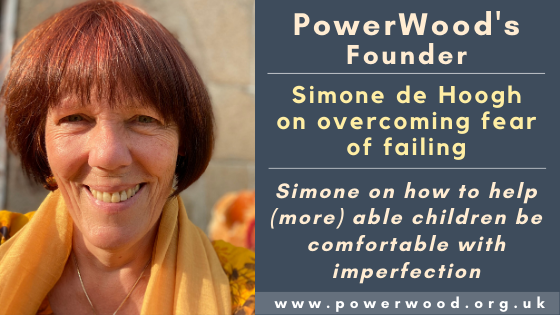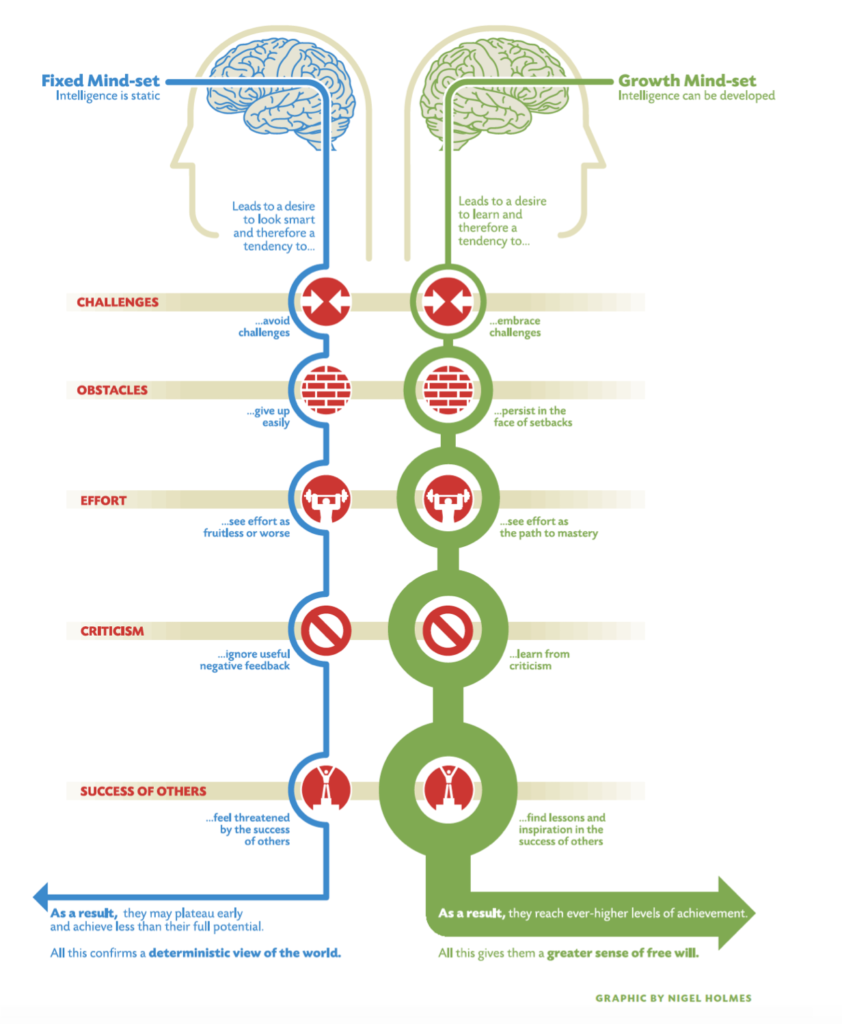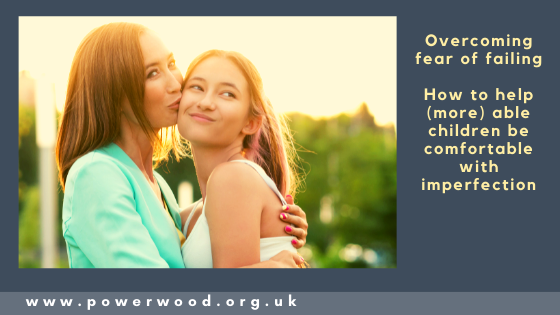Learning to learn – PART 1

Including the ‘value of uncomfortable feelings’ one of the core concepts within the Multilevel Emotion Regulation Theory (MERT) developed by Simone de Hoogh.
Without any effort
When we have a higher than average intellectual ability, we are used to understanding things on the first hearing, everything intellectually or academically is easy and we don’t experience it as a challenge, therefore we don’t learn to cope with feelings that might be triggered when we are challenged.
However, as we progress through academia and life we may find that things don’t always come so easily and that we are not always able to achieve the level of perfectionism that can come with the fixed mindset (see picture) that we are intelligent. When this happens, we might face feelings triggered by our changed perspective and give up because we haven’t learned the skills to learn. This is one of the main reasons for the high percentage of highly able dropouts in school and university.

Even if we have never had the need to organise our learning or knowledge or to work through the feelings of fear or disappointment within ourselves that come with being challenged, we can guarantee that there will come a time when we will need these skills. At a certain moment in our lives whether as highly able children, teens, even as a PhD student, we all will encounter the limits of our ability to contain knowledge in our head without any form of organisation. Likewise, there will come a point where we are not able to understand offered information without any effort. Inevitably, there will become a conflict between reality and our idealised self – otherwise known as the Gap Energy – and we need to be prepared for that.
Emotionally challenged
Feeling emotionally challenged when we haven’t learnt any strategies to cope with those uncomfortable feelings or know how to to overcome such obstacles can cause ‘narrowing behaviour’ in our children.
Narrowing behaviours are traditionally associated with mental health issues, which can also be seen as a stress response to adversity, and are narrowing their freedom to achieve whatever they want.
All children (and adults) who are emotionally overloaded will flag this up with (temporary) narrowing behaviours. This can be by having a tummy ache, or a headache, being grumpy, lashing out, sleep issues, nail biting, or overly trying to control their outside or the inner world by e.g. depression, anxiety, obsessive or compulsive thoughts or phobia-related fears or any other ‘narrowing’ behaviour.
Children and adults displaying this type of behaviour are sharing with us they are stressed, emotionally overloaded – or that something, someone or a situation is draining their Baseline. In resorting to a narrowing behaviour, they are trying to recreate a false sense of safety – to at least have some sense of control at some level. They are stuck for now in the Cycle of Emotional and Sensory overload, and often use their intelligence, dedication and effort to create the ‘perfect inaction’ situation in order not to have to address these uncomfortable feelings, and need our support to get out.
Getting smarter
Our brain is a muscle – and just like any other muscle, if we don’t use it, it loses strength. If we don’t use the developed neurological pathways in our brain they peter away and our intelligence will decrease.
Every time we try to understand something that costs us effort, every time we feel uncomfortable because we are not sure how to get through a question or an assignment is an opportunity for intellectual and emotional growth. If we manage to persevere and not let our uncomfortable feelings distract us from our goal, and want on to find the solution or finish our assignment, we are creating new neurological connections in our brain and increasing our intelligence.
Perfectly inactive
Many of us develop a fear of failure due to a combination of Asynchronous Development, a deep need for intensity which might come with less strong emotion regulation skills, a ‘fixed mindset’, and ‘Gap Energy’ – the difference between our current and ideal selves. Together, these might trigger us into a ‘perfectly inactive protective mode – which is designed to prevent us from feeling overwhelmed – instead of the more productive ability to be emotionally OK with being ‘imperfectly active’.
Value uncomfortable feelings
We all experience uncomfortable feelings, for example when we step outside our comfort zone, when we are being challenged or going through hormonal changes or life-changing events. Uncomfortable feelings always trigger us into the Stress Response – the automatic and usually not helpful behaviours and thought patterns we fall into when stressed, such as yelling, picking a fight or giving up etc.
By allowing uncomfortable feelings to just be, and staying with them as we experience them, we also create the space to be true to ourselves within a challenging situation, steering away from being defined by our stress responses, or falling into thinking, doing, or action loops to prevent the uncomfortable feelings.
Being able to accept uncomfortable feelings, which are transitory and fade away after 90 seconds, is a genuine help in growing emotional independence.

Uncomfortable feelings and growth
Staying with uncomfortable feelings is not only a very important skill to get where you want, to change and to achieve, it also helps increase intellectual ability.
The only way to create new neurological connections and increase our intellectual ability is by:
- Using existing connections (otherwise they peter away)
- Create new connections by stepping out of our comfort zone.
Stepping out of our comfort zone creates often uncomfortable feelings e.g. feeling inadequate and not knowing for sure if we will find a way to understand a difficult concept. We may be unsure whether we are able to create an overview of a complicated task or to finish a task in time on the right level, or do something that feels very daunting emotionally, and yet still go ahead. These are the only ways in our lives to create new neurological connections and increase our intellectual, emotional, practical and creative abilities.
If our child, for example, refuses to do her or his homework, revise for exams or practise playing his or her instrument, or refuses to learn a new skill, or it takes all the time but there is no progress, our child is telling us they feel overwhelmed by the task at hand for emotional reasons and they need our guidance to get through those uncomfortable feelings.
We as adults can model to our children how to take on doing things when they make us feel uncomfortable, showing our children how we learn and and use those opportunities for our personal growth.
For example, we can make a mindmap of all the situations, actions, thoughts that make us feel uncomfortable and use those for our personal growth. A first step would be every time we are aware that uncomfortable feelings are triggered we just say to ourselves “I’m proud and grateful to be aware I have a not helpful feeling” followed by a breathing exercise like the 4-7-8.
In my next blog “When the going gets tough – helping bright kids with simple tools to overcome the fear of imperfection/failing– Learning to learn PART 2” I will guide you step by step through e.g. how to support your bright child to get over their emotional resistance towards their homework, or if you are home educating, getting your child to step outside their comfort zone.
© Simone de Hoogh 2021
You might be interested in reading Abigail’s post ‘Beauty of Broken Things’ as it views creativity as an opportunity to learn.
Help us to continue support to all neurodiverse families and individuals
PowerWood offers to neurodiverse families understanding, simple tools and strategies that enable us to support ourselves and our children through emotional overwhelm. If you enjoy reading the articles please support PowerWood making all information available to all by becoming a PowerWood Community FreeBee or Friend member. Thank YOU!

